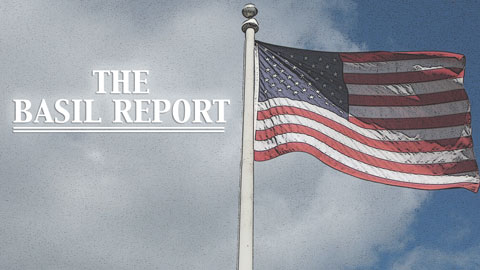This week’s headlines gave the United States a taste of the future international order.
“Japan Caves In on China” was on page A13 of the Saturday Wall Street Journal. It should have been a front page story.
The story, in case you missed it, started on September 8th, when a Chinese fishing boat captain was detained after his ship allegedly rammed into two Japanese naval vessels in waters off a disputed island chain that, while uninhabited, is in an area rich with fish, oil, and natural gas deposits.
What normally might have been an embassy-level incident escalated as China harshly escalated tensions and unleashed a furious diplomatic blitz.
State-controlled media in the People’s Republic added fuel to the flames, accusing Japanese Prime Minister Naoto Kan of intentionally seeking to damage Sino-Japanese relations. That was just the beginning: Beijing suspended diplomatic talks on energy cooperation and reduced visits to Japan by Chinese tourists. Perhaps unrelated, yet still suspiciously timed, was the arrest by Chinese authorities of four Japanese for alleged espionage.
The scariest piece of retaliation? China, which mines 93% of the world’s rare earth minerals, halted all shipments of the metals to Japan, whose auto industry in particular is reliant on the metals for advanced electronics.
Japan, given its two-decade long economic stagnation and aging population, has been loath to be aggressive on the international stage, especially towards the rising Great Power that is China. At first, the country took an unusually firm line, refusing to retreat. In the end, however, Tokyo could not take the heat, and released the captain unconditionally.
This is but the most recent example of China’s increasingly belligerent “diplomacy”. Despite international pressure, and the threat of American sanctions, the communist country has refused to end both the manipulation of its currency and the state subsidies that make its exports artificially competitive. Beijing has also pushed ahead with the sale of two nuclear reactors to Pakistan, even though it violates international guidelines.
Geopolitically, China has also become increasingly confrontational in its local sphere of influence. The country warned the United States not to attempt to mediate territorial disputes, like the one that resulted in last week’s flare up, between the country and its neighbors in the South China Sea – effectively China’s equivalent of the Caribbean.
As China moves towards dethroning the United States as the world’s foremost superpower, this arrogant aggression will become commonplace, a development that will be good for neither regional stability nor economic growth.
Some believe that China can be integrated into the international system as a “status quo power” whose emergence will not lead to significant disruption. There is no basis for this belief.
China is going through the same period of development as was the US at the turn of the 20th century. The period receives little attention in American history, probably because it was the period when the United States was a brutal imperial colonizer. We overthrew governments and claimed islands throughout the Pacific (see: Philippines, Occupation of) and turned much of the Caribbean and Latin America into American protectorates.
Why would we expect China to act any differently than the United States during its transformation from middling power to superpower? Is Beijing more principled and ethical than the US? Less nationalistic? Less concerned about regime survival?
If anything, China today is more of all the above than Washington was. In other words, Americans should expect an increasingly aggressive foreign policy from the communists in Beijing, resulting in less regional stability and more resource warfare.
Hope exists. The full headline of the Wall Street Journal article noted above? “Japan Caves In on China; Looks to U.S.” (Emphasis added.)
As China’s economy grows in size – it recently passed Japan to officially become the second largest economy in the world – and its military grows in strength, the rest of the world, and its neighbors especially, are getting nervous and looking to the United States for help. This is our chance to contain China.
The US must maintain its strong relationship with Taiwan and Japan, especially, as they are our two “unsinkable aircraft carriers” in the region. Other nations are nervous as well: Thailand, the Philippines, Vietnam, South Korea, and Singapore have all expressed concern over China’s growing power.
Maintaining a balance of power in East Asia is the single most important step the United States can take geopolitically to decelerate China’s rise and help to maintain our preeminence over the international system.
Without good domestic governance here on US soil, however, it will be for naught. These domestic issues – tax reform, education reform, energy reform, and prison reform, among other things – will be addressed in this space throughout the year. Stay tuned.
































Worried Reader • Sep 30, 2010 at 10:35 PM
Wow, those are some scary thoughts… Is this one of the first times China has responded to such a trivial situation with a belligerent response? Also, do you expect we will be seeing a lot more of this attitude in the future?
Basil • Oct 2, 2010 at 12:55 PM
Beijing has been increasingly aggressive in recent years, especially since the financial crisis hit, and even more so since the inauguration of President Obama. For example: harassing US Navy vessels in international waters, cutting military ties following an arms sale to Taiwan, anger following a Dalai Lama visit, refusing to condemn North Korean aggression, obstruction at the UN on Iran/climate change, absurd territorial assertions, and increased rhetorical aggression.
I do think it is a safe bet to say China will be increasingly belligerent. However, if we take the steps I outline above (containing China, building a balance of power in East Asia, and good governance at home), we can maintain strategically preeminent despite the country's increasing strength and aggression.